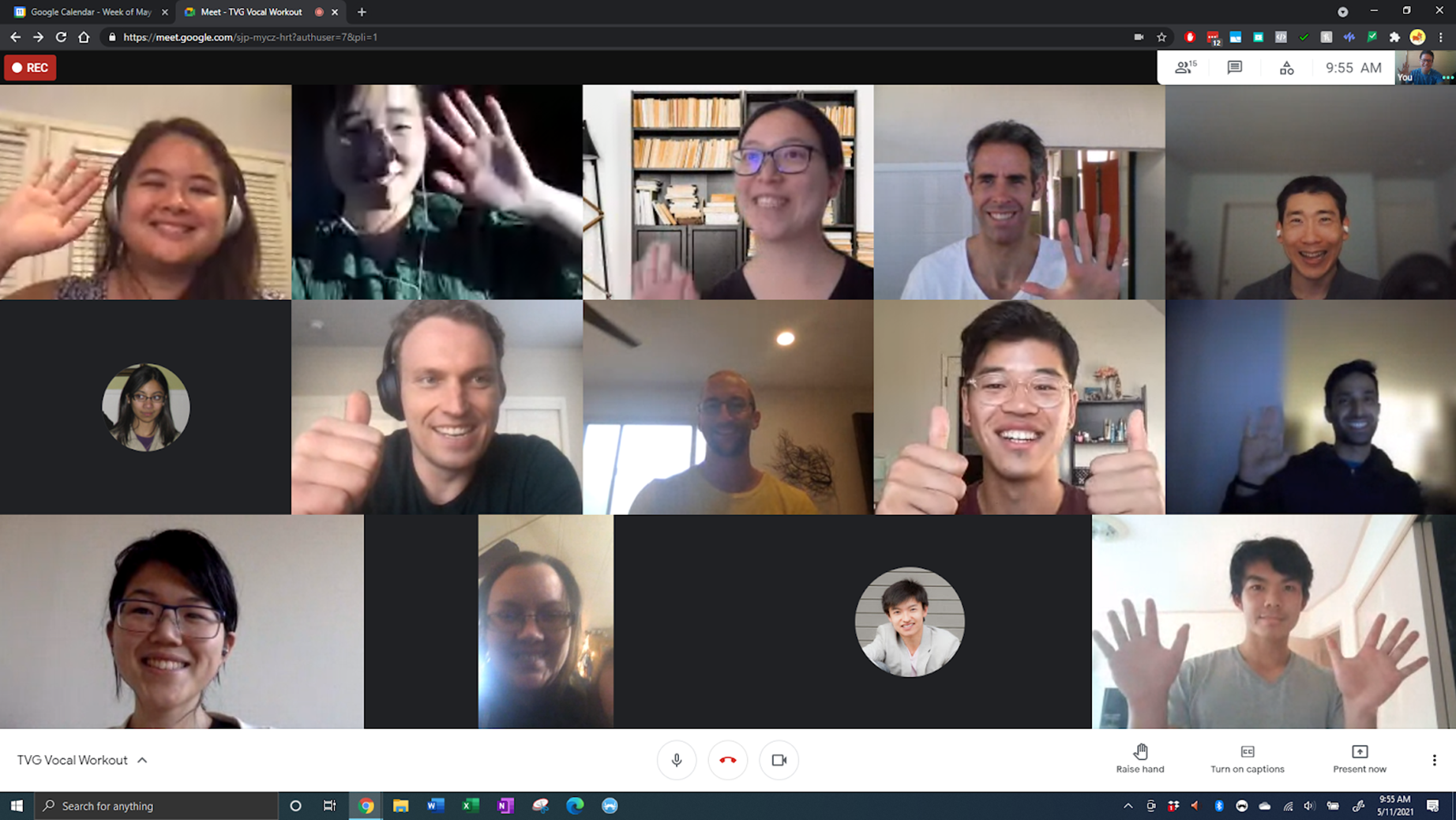Overcoming Stage Fright at Karaoke
How to deconstruct your fears and tackle your anxiety so that you can begin to truly enjoy singing
Has this ever happened to you?
It’s Friday night, and you’re surrounded by your best friends. Dinner was great, but then someone suggested karaoke, and you don’t want to hold the group back.

The TV is flashing a twirling lady in a field, clearly a stock-video, and someone is wailing “Livin’ on a Prayer” at the top of their lungs. You know you should be relaxed, and yet your palms are sweaty.
As the song fades out, what you’ve been dreading finally happens. Your friend, sweaty and panting, shoves the mic into your hands. “It’s your turn!” – everyone looks at you expectantly.
You freeze. Your mouth feels dry, and your heart is racing. You can’t recall a single song that you like to sing.

Maybe your experience isn’t quite as severe, but everyone can relate to some kind of anxiety with singing. Even professional singers – Adele, Lorde, Eddie Van Halen, Rihanna, Katy Perry, Barbara Streisand, and many others, have described feeling severe stage fright.
We’re here to tell you – there is a way out.
In this article, we’ll deconstruct the sources of your anxiety, and then define actionable steps including 2 Tried and True techniques that I use with all of my students so that you can unleash your voice.
Where does your anxiety come from?
First, know that everyone’s experience is different, so it’s good to interrogate where your anxiety comes from. Understanding what is fueling your anxiety may help you tackle it more effectively.
Here are some common possibilities, although there are many more:
Insecurity around vocal technique – That your voice might crack when you go for the high note, you don’t think you’re singing the right notes, etc.

Perfectionism, or disliking your sound – It doesn’t sound the way you want it to, or it doesn’t sound as good as you want it to. Hearing your voice brings disappointment or shame.

Fearing judgement – Perhaps tied in with every other source of anxiety.

Anxious personality and lifestyle – You deal with anxiety in other aspects of your life.

Here are some questions to ask yourself:
- In what contexts do I feel comfortable singing, and what is it about them that puts me at ease?
- Who do I feel comfortable singing around, if anyone, and what is it about them that puts me at ease?
- What do I truly expect of myself when it comes to singing? Where do those expectations come from, and are they realistic?
- What is it about singing that I enjoy? What benefits do I seek from singing?
Make a list, write your answers down. Understanding yourself goes a long way to planning how to overcome your weaknesses.
Take Action: 2 Tried and True Techniques
No matter the source of your anxiety, there are things you can do to move towards becoming a more confident and comfortable singer.
Here are 2 tried and true exercises that I give all of my students to help them manage and overcome their performance anxiety.
Take small steps working up to singing in front of others.
Each step should challenge you just a little. Here is something you can try:
-
- Hum / sing as you do household chores at home, with no one else around
- Hum while walking on empty public streets
- Hum softly as you pass people in public, gradually getting comfortable having others hear you briefly in passing
- Increase your volume over time, or switch over to lyrics
Accept each step as a fresh challenge. Progress through the steps at your own pace, but motivate yourself with deadlines and setting accountability measures. For example, do the steps over 2 weeks each, and ask a loved one to check in.

Use a pre-performance routine
to calm the body and mind, and channel anxious energy in more positive ways. Mindfulness is a proven tool to manage nerves. Here is what that could look like:
- A minute before performing, start thinking about the song itself. What is the story? What do you want the audience to feel? What atmosphere do you want to create in the space?
- Before taking up the spotlight, focus in on 1 or 2 strong emotions that you want the audience to feel. Try to feel it yourself.
- As you step into the spotlight, take 2 or 3 slow deep breaths.
In this process, you are first redirecting focus away from your own ego and insecurities, and towards serving the song and audience. Then, with the deep breaths, you calm nerves and re-anchors your body in healthy singing technique.

A few other possibilities to consider:
Everyone is different, and you know yourself best. Ultimately, you should do what is best for you. But if you are ready to take action, here are some other places to start:
If you are insecure about your singing technique…
-
- Understand your limits, and work around them to set yourself up for success. Bruno Mars songs sound great when he sings them because they’re arranged around his vocal strengths, not yours. Become familiar with your vocal range and tone so that you can pick songs that match. Don’t be afraid to sing in a different octave, or use the transpose buttons.
- Experiment with your voice on your own. This will help you understand your voice and its limits, and might also lead to techniques that work unexpectedly well for you.
- Take lessons, or join a singing program. The science of singing is a relatively new field. A coach or program should be up to date in understanding how voices work, and be able to guide you towards new techniques.
Perspective shift: Humans have sung since the beginning of human history, way before singing lessons or voice science were created. And there are plenty of amazing singers who’ve never had a lesson in their life, but still found their way to a great sound. Not having “formal knowledge” or “the right technique” does not have to stop you. Even if you aren’t sure about what you’re doing, as long as it’s not uncomfortable and you’re not losing your voice, you can be singing and experimenting however you want.
If you are perfectionist, or don’t like the sound of your own voice:
-
- Narrow the scope: prepare specific songs – Instead of mastering your voice to tackle any song, start with picking a single manageable song. Record, listen back, and iterate. Use imitation – “how would Billie Eilish sing this?” to stumble upon new sounds and interpretations.
- Explore other styles – You might stumble upon genres that fit how you’re already singing. For example, lots of today’s male pop songs might be out of your current comfortable range if you have a lower baritone voice. Some jazz or country, which more commonly feature lower voices, might suit.
- Learn to accept risk by trying improvisation. It forces you to become comfortable rolling with the punches, and build confidence that you can overcome tricky situations.
- Reframe your relationship with singing – Of course, this is much easier said than done, so be kind to yourself! Take a step back and (re)set realistic expectations. If singing is just a hobby or for fun, instead of focusing on the skill or quality of your voice, how can you maximize the fun in singing? If you’re a beginner, approach things with a Beginner’s Mind. Expect to do things badly sometimes, and focus on the process rather than the outcome.
Perspective shift: There is a biological reason why we dislike the sound of our own voice. Most people typically describe their voice as sounding high, shrill, or annoying. While some sound is transmitted through the air and into our ear from the outside, much of your sound is conducted directly through the tissues and bones in your neck and skull. These are better at conducting lower frequencies, so we’ve been conditioned to expect a deeper, richer version of our voice.
If you are afraid of judgement...
-
- Shift your perspective: Reframe your relationship with singing, your expectations for yourself, and assume the Beginner’s Mind (see above, and the perspective shift below).
- Find the right support: Do you feel like you’re singing in a safe space? If you feel that you’re being judged, consider who might be doing the judging, and where you might find a less judgemental crowd. A group singing program might be a great place to start, where you’re in a cohort with other learning singers.
Perspective shift: There are many cultures which more openly encourage singing in upbringing and daily life. Consider the forces in your society – singing competitions on TV which make fun of contestants, teachers who put letter grades to subjective qualities, etc., which have contributed to your feeling judged today. Then, think about how you would react if you saw someone happily humming or singing along to their music in public. In most cases, as long as it’s not obnoxiously loud, people generally find it endearing and uplifting.
If you have an anxious personality or lifestyle...
-
- Consider a mindfulness practice. There are many which complement singing really well, such as breathwork, yoga, or mantra / chanting.
- We won’t claim to be experts in diagnosing and treating anxiety disorders which may affect you outside of your singing practice. Chances are, you are already taking steps to address them. However, even singers with generalized anxiety can still take any of the steps above. Just remember to be patient and loving with yourself, and take the long view.
Conclusion
Ultimately, dealing with anxiety related to your voice will take time, patience, and courage. Take time to understand yourself and the source of you anxiety, and define small and manageable actions that may help you reframe, expand, or recontextualize your singing practice. And remember to be kind to yourself in the process.
You can experience the benefits of singing no matter where you are on your singing journey.

We created The Vocal Gym to help people become more comfortable with their voice. Weekly group lessons with other engaged singers create community and make it easy to stay consistent. You get access to top coaches at a fraction of their private lesson cost and have opportunities for feedback through video submissions and other events.

Robert Lee
Founder
Robert Lee is a vocal coach, music director, and founder of The Vocal Gym. Read his bio here

Recent Comments